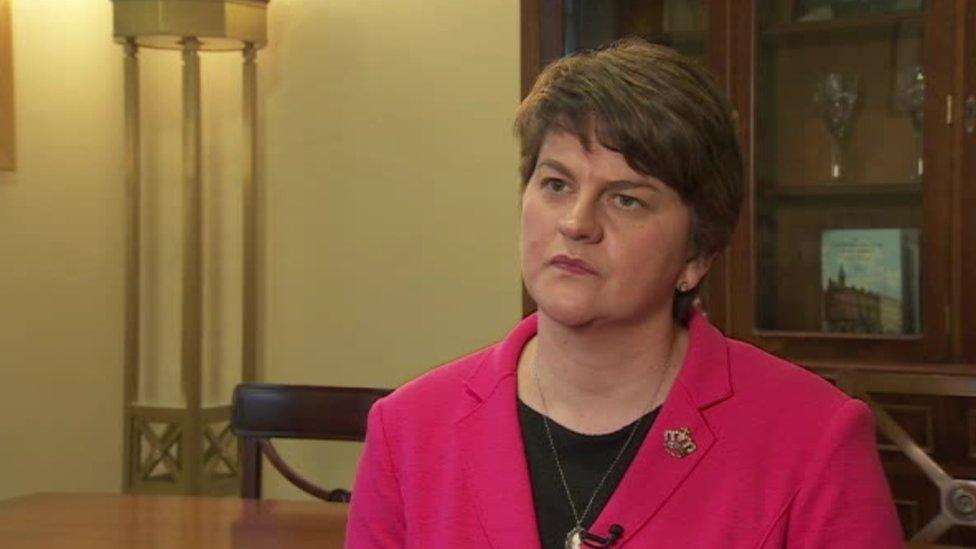Arlene Foster: Profile of the Democratic Unionist Party leader
- Published
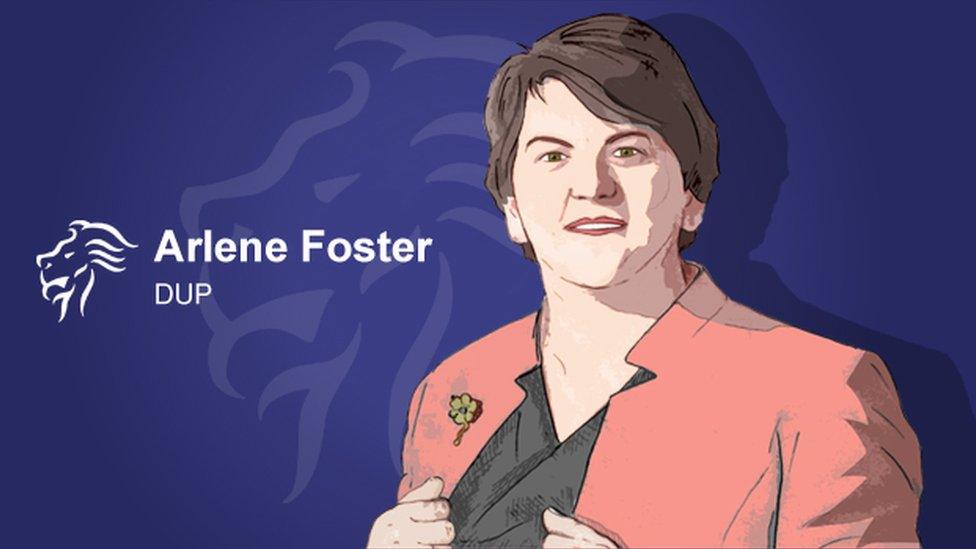
Arlene Foster, leader of the Democratic Unionist Party (DUP), could be about to become the second most important person in British politics.
Her party is making a deal with the Conservatives to keep them in power.
Mrs Foster has plenty of experience of unlikely political marriages, having spent years in coalition government with unionism's long term political opponents, Sinn Féin.
Given that the IRA once tried to murder her father, she knows more than most about political compromises.
The DUP's deal with the Tories is likely to fall well short of a formal coalition - Mrs Foster's party is more likely to prop up a minority Conservative government.
A look at DUP leader Arlene Foster's career to date
However, the opportunity to play a role at the heart of the UK government comes after a very difficult few months closer to home for the DUP leader,
For many years, Mrs Foster was viewed as a strong and capable government minister, whose traumatic personal experiences shaped her passion for the unionist cause.
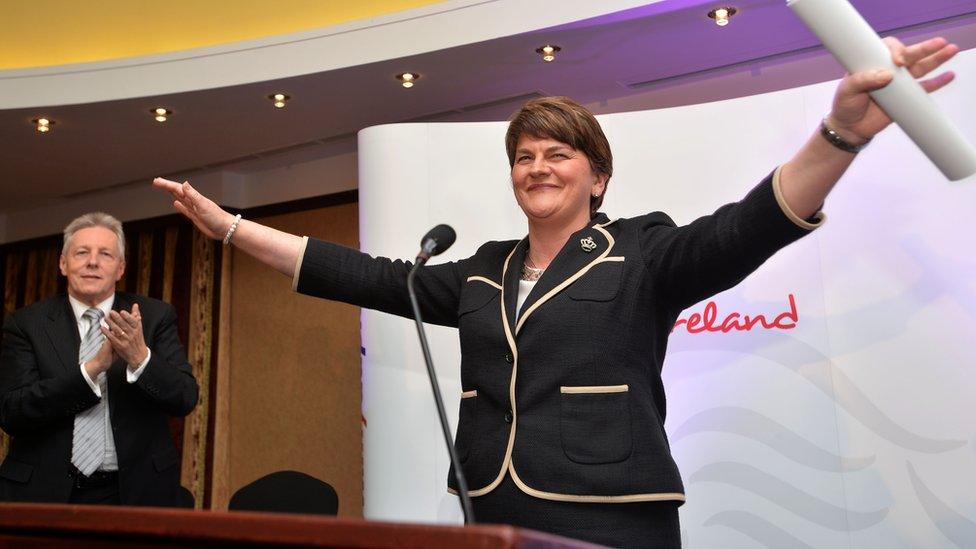
Arlene Foster became the first woman to lead the DUP when she took over from Peter Robinson (left) in 2015
She became leader of the Democratic Unionist Party in December 2015 and, the following month, she was appointed first minister of Northern Ireland.
Mrs Foster is the first woman and the youngest person to hold both jobs.

Arlene Foster was photographed on the steps of Stormont on 11 January 2016, on her first day as first minister of Northern Ireland
But she lost her job as first minister of Northern Ireland in January after Sinn Féin pulled the plug on their power-sharing coalition at Stormont in protest at her role in a controversial green energy scheme.
Dubbed the "cash-for-ash" scandal, the cost of the Renewable Heat Incentive (RHI) scheme she set up in 2012 spiralled out of control and saddled taxpayers with a multi-million pound bill.
The controversy brought both her leadership, and the very future of Stormont, into doubt.
Born Arlene Kelly in 1970, Mrs Foster grew up on a farm in rural County Fermanagh, close to the Irish border.
Her mother hailed from Belfast's Sandy Row while her father, farmer John Kelly, was also a reservist police officer in the Royal Ulster Constabulary (RUC).
The Troubles played a significant role in her childhood - when she was eight years old, the IRA attempted to kill her father by shooting him outside their family home.
"My father came in on all fours crawling, with blood coming from his head," Mrs Foster told the Belfast Telegraph, external in 2015.
Mr Kelly survived the attack, but the family was forced to sell their farm and move away, under a government scheme set up for Troubles victims under threat.
But leaving their home did not stop the attacks. About 10 years later, the IRA set off a bomb on her school bus.

An IRA bomb exploded under a school bus in which Arlene Foster was travelling in 1988
The target of the attack was the bus driver, who was also a part-time soldier in the Army's Ulster Defence Regiment (UDR).
The teenage Arlene Kelly was not hurt in the explosion, but a schoolgirl sitting next to her was seriously injured.
'Don't panic'
Interviewed by BBC News in the aftermath of the bombing, the young Arlene said: "Gillian fell on top of me, sideways, and then there was about two or three seconds silence.
"Then everybody started to scream, I got up and said: 'Don't panic, don't panic'... Everybody get out'.
"Ernie, the bus driver, was coming down, helping us all get out and Gillian said 'I can't move' and that's when I saw her arm; it was completely covered in blood."
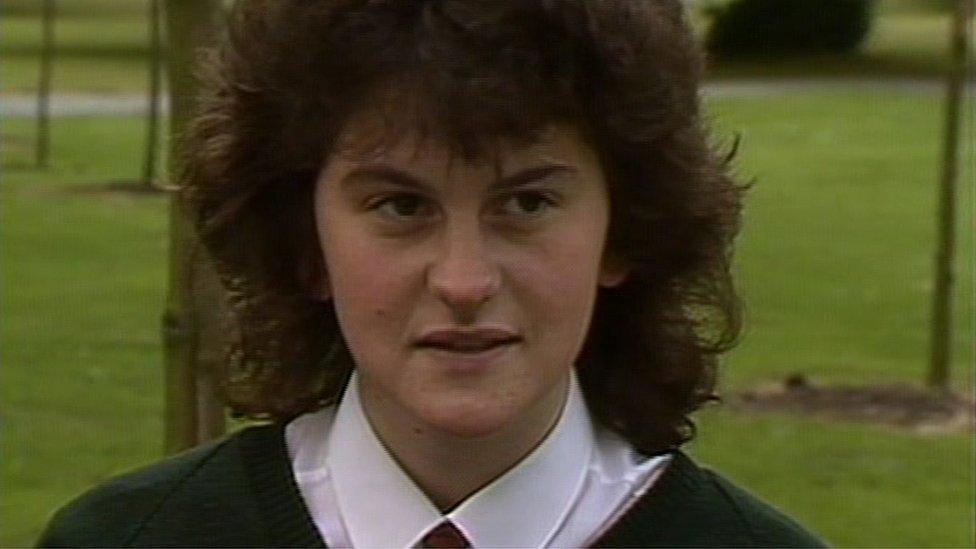
In 1988, the then teenage Arlene Kelly was interviewed by the BBC in the aftermath of the bomb
When she left grammar school in Enniskillen, the future Mrs Foster became the first member of her family to go to university, taking a law degree at Queen's University, Belfast (QUB).
She became politically active at university, joining the Ulster Unionist Party (UUP) and becoming chair of QUB Ulster Unionist Association.
After university, she qualified as a solicitor and began working in private practice in Enniskillen and Portadown, County Armagh.
On 24 August 1995, at the age of 25, she a married a nephew of the veteran UUP politician, Sam Foster.
The couple went on to have three children.
In 2003, Mrs Foster was elected as a UUP Assembly member for her home constituency of Fermanagh and South Tyrone.
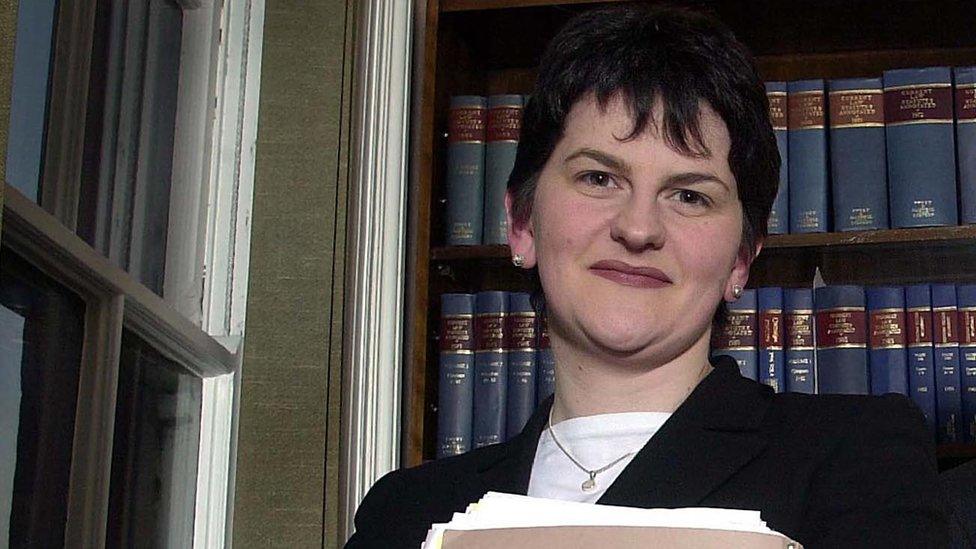
Arlene Foster worked as a solicitor after taking a law degree at Queen's University, Belfast
However, she vehemently opposed the Good Friday Agreement and the following year, she defected to Ian Paisley's Democratic Unionist Party (DUP).
The DUP quickly recognised her as an asset and Mrs Foster was appointed environment minister when the party entered government with Sinn Féin in 2007.
'On time and on budget'
The following year she was appointed minister of enterprise, trade and investment - a role she would hold for the next seven years, staying in post throughout Northern Ireland's deepest economic downturn through to the beginning of its recovery.
One of the highlights of her Department of Enterprise, Trade and Investment (DETI) ministry was the opening of the Titanic Belfast - which has earned a reputation as one of the world's leading tourist attractions.
The £77m exhibition centre was delivered on time and on budget, facts that she emphasised at its official opening.
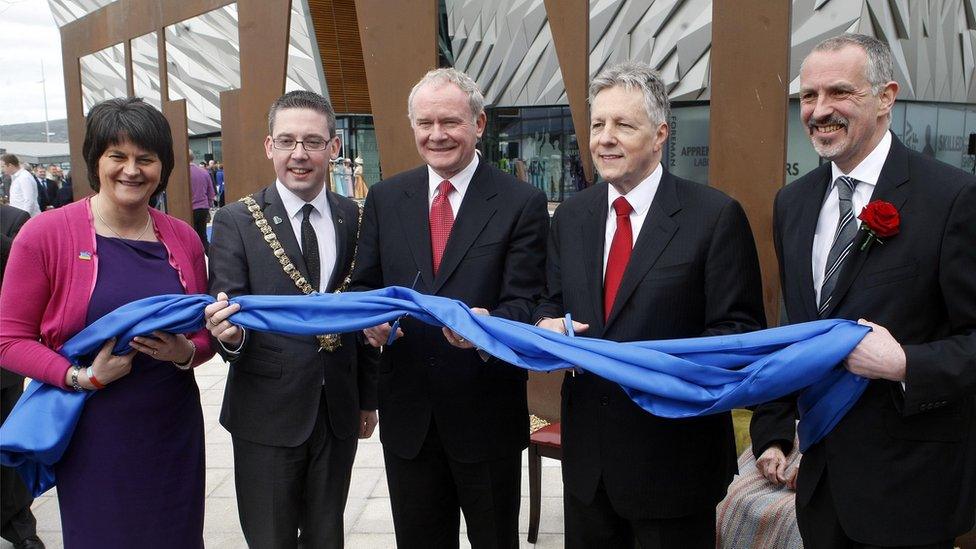
One of the highlights of Arlene Foster's tenure as DETI minister was the opening of the Titanic Belfast in 2012
An indication of just how highly she was regarded by her party came in early 2010.
The then DUP leader, Peter Robinson, stood aside as first minister for a few weeks in the aftermath of a financial controversy, following his wife Iris's affair with a teenage businessman., external.
He appointed Mrs Foster to replace him on a temporary basis, while he was investigated and cleared of any wrongdoing relating to his wife's business dealings.
When Mr Robinson returned to his job, Mrs Foster enhanced her reputation as his key ally, often accompanying him to significant meetings and news conferences.
And during rocky times, she was frequently the party's first choice to go on the airwaves.
She had proved herself in high-profile government roles, and when Mr Robinson resigned as first minister in late 2015, Mrs Foster was elected unopposed as his successor.
The mother-of-three passed her first electoral test in May 2016, when the DUP consolidated its position as the largest party in Northern Ireland.
Sinn Féin and the SDLP both lost seats in the 2016 poll, while her former party, the UUP, failed to challenge her dominance as the voice of mainstream unionism.
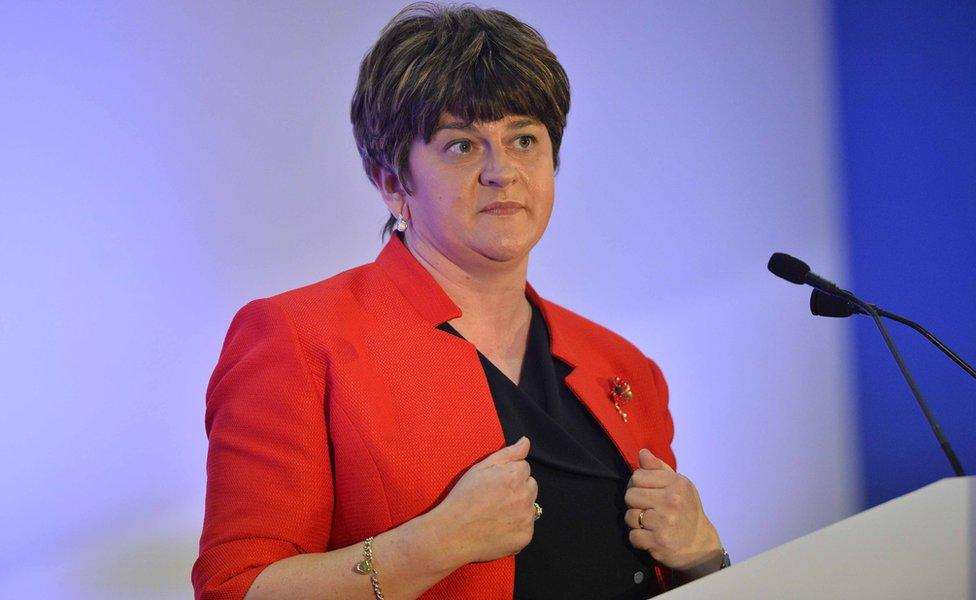
Arlene Foster was in a position of strength at her first annual conference as DUP leader in 2016
The following month, Mrs Foster was on the winning side of the Brexit debate when the UK voted to leave the European Union.
However, her critics, including Sinn Féin, regularly point out that 56% of the Northern Ireland electorate voted to remain in the EU.
'Money to burn'
As first minister, she took a strong stand against terrorism, but her office has faced questions after it gave almost £2m to a community organisation led by a man with recent loyalist paramilitary links.
In October 2016, Mrs Foster was photographed alongside with Charter NI's chief executive, Dee Stitt, who is also a leading member of the Ulster Defence Association (UDA).
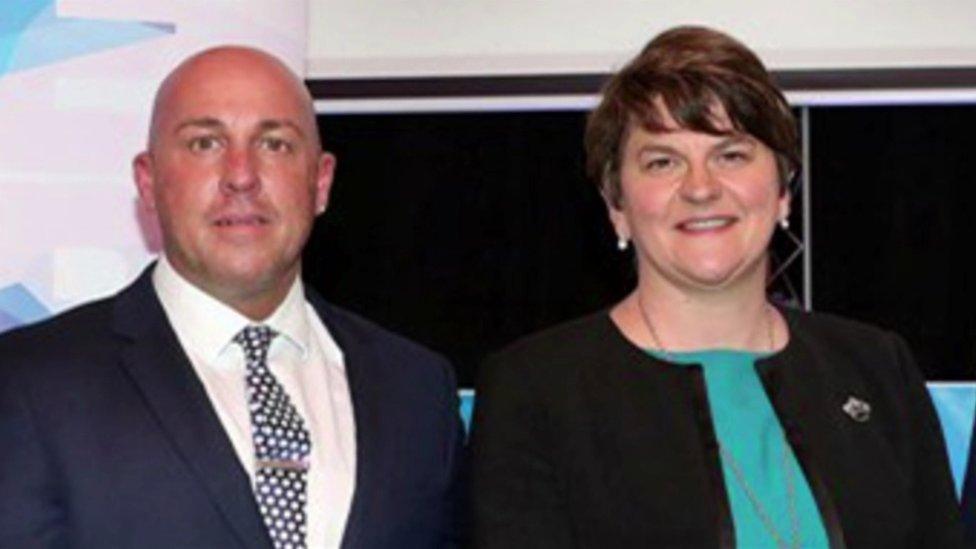
Dee Stitt was pictured with Arlene Foster after her office awarded Charter NI £1.7m from Stormont's Social Investment Fund
Days later, Mr Stitt launched a foul-mouthed attack on the government in a Guardian newspaper interview, vowing to "defend north Down against anybody".
Mrs Foster said he had become a "distraction" to Charter NI's community work, but did not add her voice to calls for Mr Stitt to step down as its chief executive.
Mr Stitt has previous challenged allegations that he was a UDA leader.
In December 2016, Mrs Foster found herself at the centre of a controversial green energy scheme, the so-called cash-for-ash scandal.
The aim of the Renewable Heat Incentive (RHI) scheme was to encourage businesses to switch to renewable fuel systems, such as wood pellet burners.
Mrs Foster launched it in 2012 when she was Stormont's economy minister.
However, a lack of cost controls and overly generous subsidies meant boiler owners could profit from the scheme - the more fuel they burned, the more money they earned.
A whistleblower claimed the subsidy scheme was being abused, with claims that one farmer aimed to collect about £1m over 20 years for heating an empty shed - fuelling "money to burn" claims. It was never proven.
The whistleblower wrote to Mrs Foster to report her concerns, and the then DETI minister passed the details to her officials for investigation, but the scheme continued to operate.
RHI was closed to new applicants in February 2016 by Mrs Foster's successor in the DETI department, DUP minister Jonathan Bell.
But in an extraordinary interview with the BBC 10 months later, Mr Bell broke ranks to claim Mrs Foster and two top DUP advisers tried to prevent him from shutting it down earlier.
Mr Bell also claimed that Mrs Foster was verbally abusive when she "overruled" his attempt to close the scheme.
Arlene Foster was "highly agitated" when Jonathan Bell tried close the RHI scheme, he says
In response, Mrs Foster apologised for the lack of cost controls in the RHI scheme but denied any wrongdoing.
Despite being shut to new claimants, payments continue to be made to boiler owners whose RHI applications were approved before the scheme was closed.
As a result, it was projected that more than £1bn of public money was to due to be paid out by the UK government over the next 20 years - with £490m coming from Stormont's block grant.
Cost controls have since been introduced for 2017/18 which will greatly reduce that amount, but RHI recipients who will lose out are set to challenge cost-cutting measure in the courts later this year.
The DUP leader faced calls for her resignation when the full implications of RHI were made public, but she resisted saying she had done nothing wrong.
Sinn Féin then demanded that she step aside temporarily for an inquiry to take place, and when she refused, the late Martin McGuiness resigned as deputy first minister.
The nature of their joint office meant that when he quit, she lost her job as first minister.
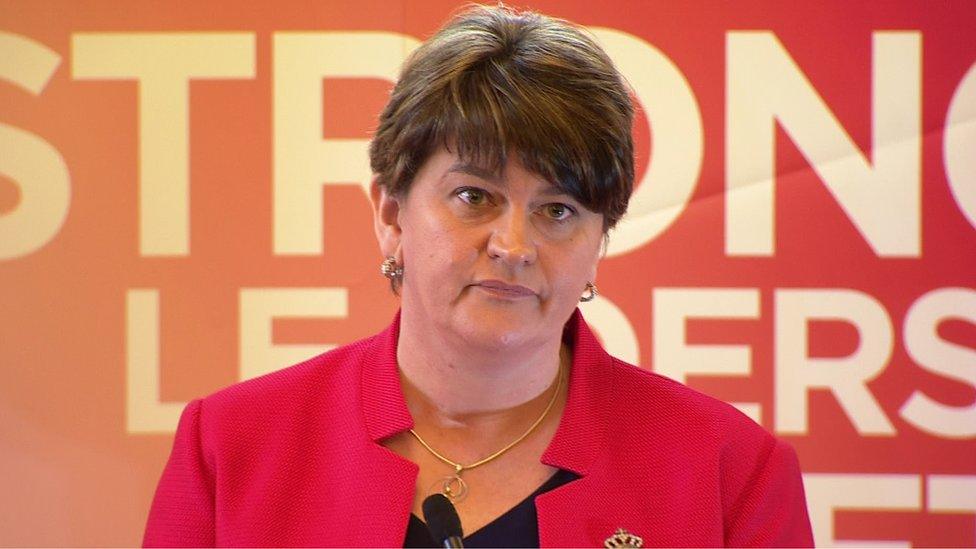
Arlene Foster compared Sinn Féin to a "crocodile" that would keep coming back for more
The collapse of the coalition government in January 2017 meant Northern Ireland's secretary of state had to call a snap assembly election.
During a bitter, and in her own words "brutal" election campaign, Mrs Foster repeatedly warned unionist voters that Sinn Féin could overtake the DUP as the biggest party at Stormont.
'Absolute disaster'
Controversially, she compared Sinn Féin to a "crocodile" that would keep coming back for more when she was asked about their demand for an Irish Language Act.
The reptilian insult resonated with republicans, with some commentators suggesting her remarks galvanised the Sinn Féin vote., external
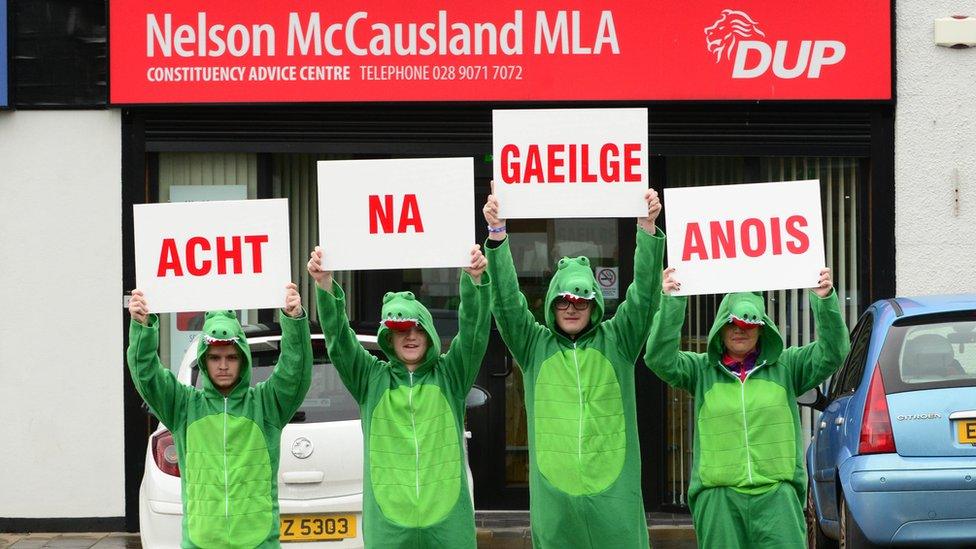
Republicans embraced the crocodile comparison during the election campaign
In the end, the DUP won the election and retained their place as the biggest party at Stormont.
However, Sinn Féin snapped at their heels, narrowing the gap to a single assembly seat and 1,168 first preference votes.
Perhaps more significantly, the result brought an end to unionists' overall majority in the Northern Ireland Assembly.
The SDLP overtook the Ulster Unionist Party for the first time, and nationalists now hold the same number of seats as unionists, in Stormont, with non-aligned parties holding the balance of power.
Author and academic Prof Jon Tonge, who has written a book about the DUP, called the assembly election an "absolute disaster for unionism".
"They may never, ever regain their overall majority in Stormont. So, from going from a very powerful position only last May 2016, suddenly unionism is in crisis."
Mrs Foster remained in post as DUP leader, but appeared to adopted a more conciliatory tone.
In April, she spoke in the Irish language for the first time at a school in Newry, County Down.
Meeting staff and students at Our Lady's Grammar School, the DUP leader used the phrase "go raibh maith agat" [thank you] in a visit filled with political symbolism.
Arlene Foster says thank you in Irish during school visit
However, week of talks between Stormont's biggest parties continued in deadlock, with Sinn Féin reiterating their demand that Mrs Foster step down or face another assembly poll.
After the Easter recess, Prime Minister Theresa May pulled the rug from under all UK parties by calling a snap Westminster election.
The shock move meant that the talks were put on hold during campaigning.
The results of the Westminster vote further polarised politics in Northern Ireland, with the DUP and Sinn Féin carving up the map between them, with the exception of a single seat.
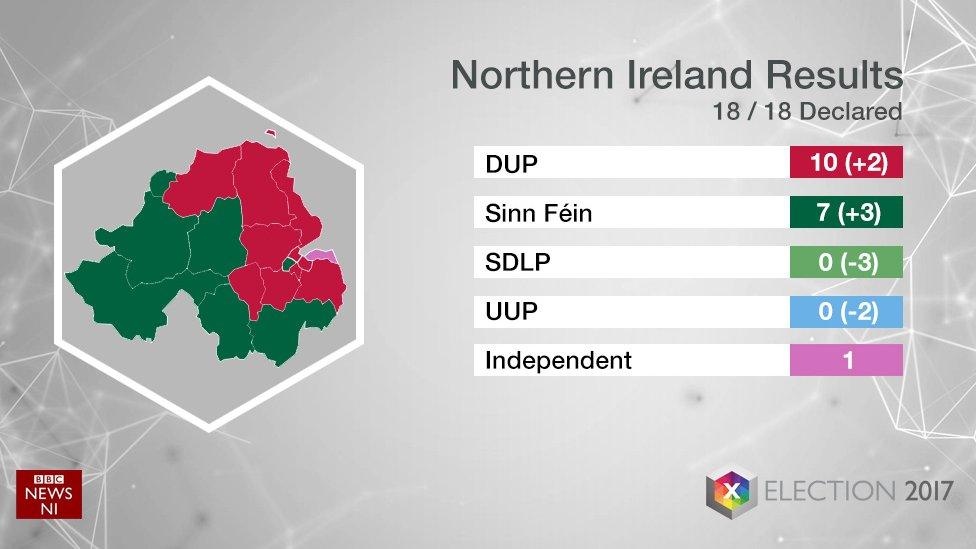
Centre-ground parties - the Social Democratic and Labour Party (SDLP) and the Ulster Unionist Party (UUP) - were wiped out at Westminster, losing all their seats.
Mrs Foster hailed the result, saying unionist voters had responded to a "wake-up call" after losing their majority in the last assembly vote.
However, it was the loss of another majority - that of the Conservative Party - which catapulted Mrs Foster into a position of considerable influence.
After it became clear that Theresa May was a handful of seats short of a government, the DUP's 10 MPs suddenly became very important indeed.
The party's website crashed on the day after the poll as a result of a surge of interest and the DUP became the most searched term on Google.
Critics of the Mrs Foster's deal with the Tories expressed concern over they price the prime minister might have to pay to stay in power.
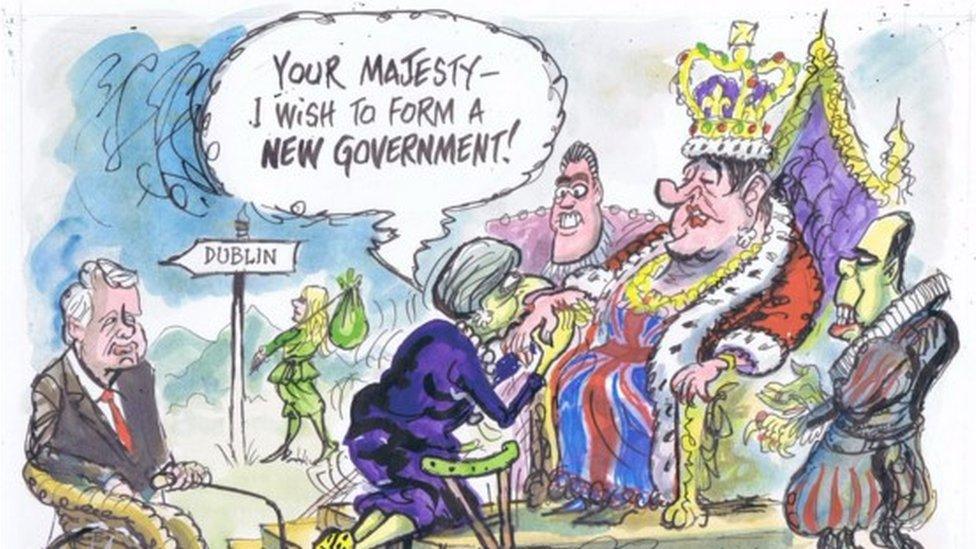
A recurring theme for cartoonists is a weakened Theresa May, beholden to DUP demands
National newspapers were scathing about some of the DUP's more controversial policies, including its opposition to same-sex marriage and abortion.
Members of the Northern Ireland Assembly have voted five times on whether or not to introduce same-sex marriage, and on the fifth time of asking, in November 2015, they voted in favour by a slim majority of 53 votes to 52.
However, the DUP then used a Stormont veto, known as a petition of concern, to block the motion and prevent any change in the law.
Discussing the move the following year, Mrs Foster insisted her party was not anti-gay and claimed they had been the target of "very, very vicious" abuse on social media by some gay rights supporters.
She said: "Do they seriously think they are going to influence me by sending me abuse?
"No, they are not going to influence me by sending me abuse - in fact, they are going to send me in the opposite direction and people need to reflect on that."
Last weekend, her party became the target of some piercing satire on social media as the UK public at large wondered who their government was considering going into partnership with.
However, the DUP leader, who refers to Westminster as the "mother of parliaments" has vowed to act in the "national interest".
- Published13 June 2017
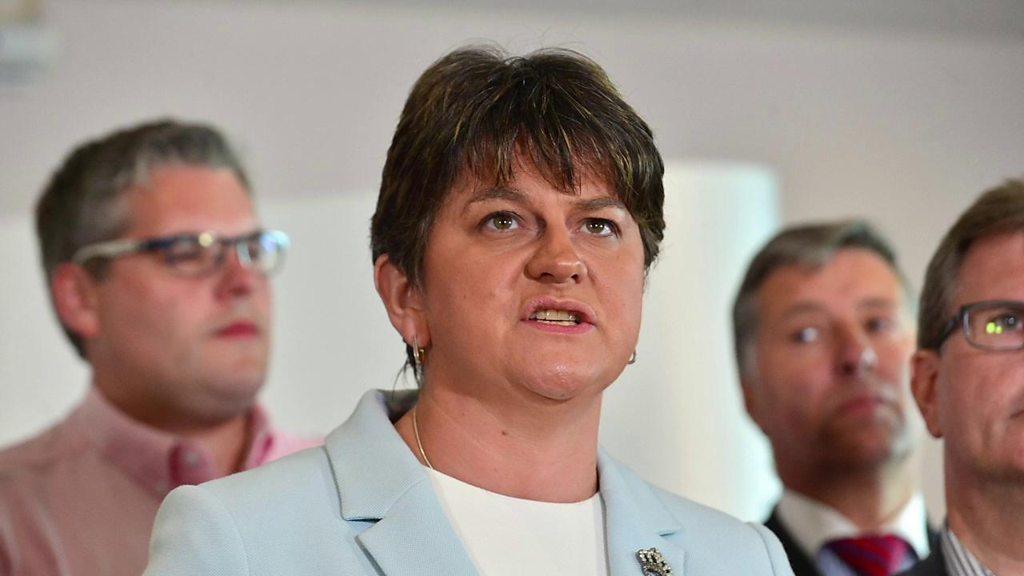
- Published17 December 2015
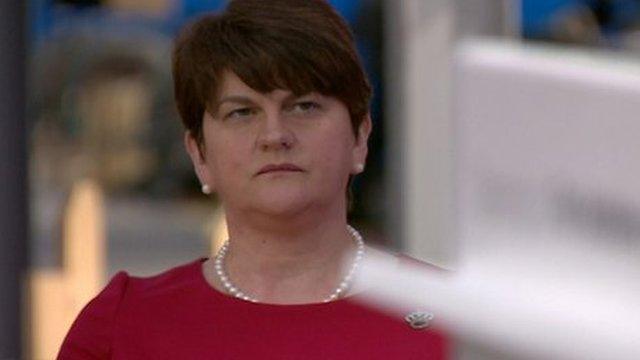
- Published18 December 2015
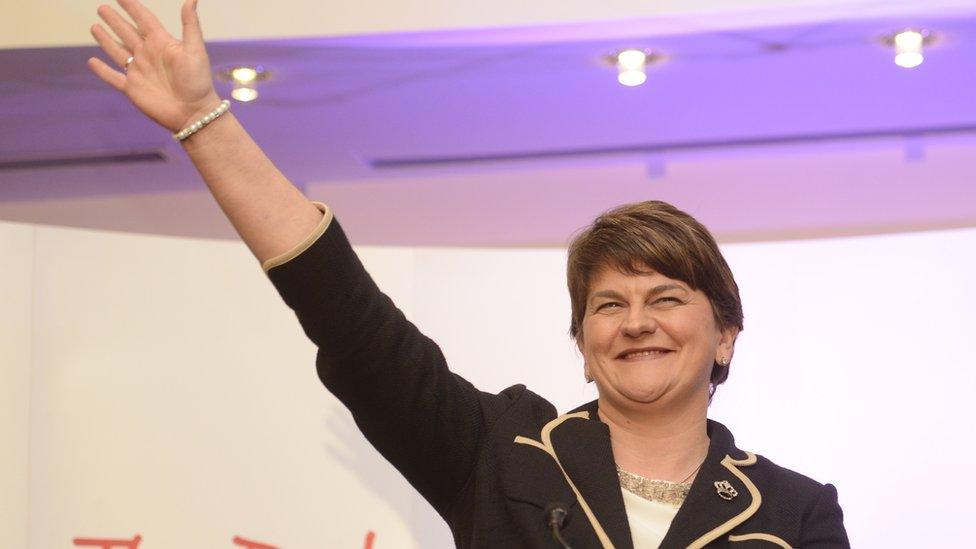
- Published17 December 2015
